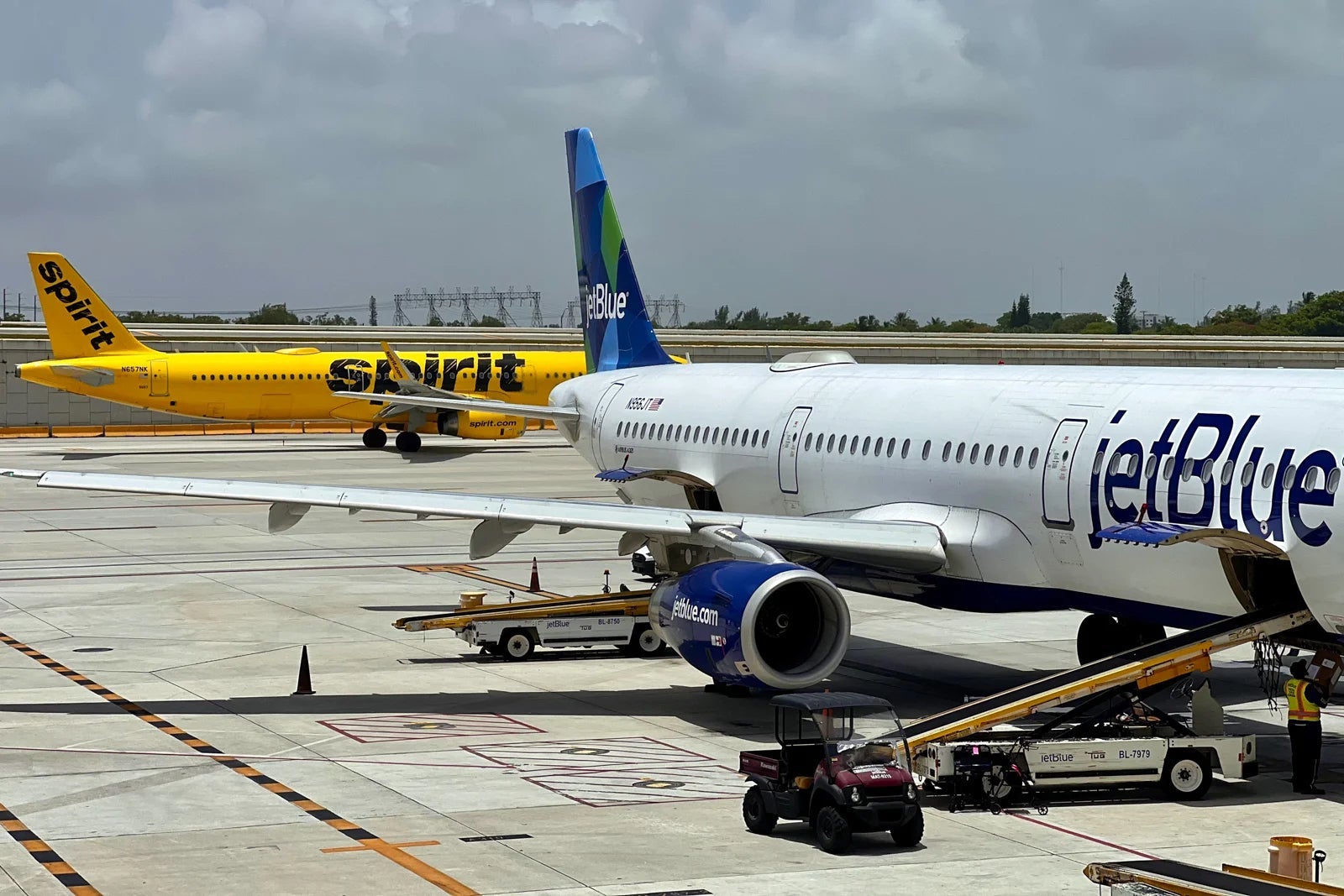JetBlue-Spirit merger thwarted? US files lawsuit to block it, citing competition concerns
The Department of Justice said it would try to block JetBlue's proposed $3.8 billion acquisition of Spirit Airlines, launching a lawsuit on Tuesday to stave off further consolidation of the airline industry.
The DOJ said it believed that a merger between JetBlue and Spirit would ultimately cause fares to increase, since a combined airline would have fewer seats and wouldn't be able to fully recover from its losses without charging more for airfare.
Since JetBlue planned to absorb Spirit into its own operation, the DOJ argued that it would effectively eliminate the largest ultra-low-cost carrier in the U.S., which has "increased competition and brought low fares to hundreds of routes across the country, making it possible for more Americans — particularly the most cost-conscious — to travel," the lawsuit read.
The merger would have created the fifth-largest airline in the U.S., but the move to block it marks a sharp turn from past precedents in which the government has approved mergers such as American-US Airways, United-Continental, Delta-Northwest and Southwest-AirTran.
""If not blocked, the merger of JetBlue and Spirit would result in higher fares and fewer choices for tens of millions of travelers across the country," said U.S. Attorney General Merrick Garland in a press conference on Tuesday.
Garland also said that, in particular, the merger would leave fewer choices for working-class and middle-class Americans, who may not be willing to spend an exorbitant amount in airfare compared to business travelers.
JetBlue and Spirit argued that they needed to merge in order to compete against the four largest U.S. airlines — Delta Air Lines, American, United and Southwest Airlines — which already dominate about 80% of the U.S. market.
The lawsuit will now put the planned merger on hold indefinitely. JetBlue and Spirit said in a press release on Tuesday that they plan to proceed with the deal and seek to "create a compelling national challenger to the Big Four airlines."
Both JetBlue and Spirit CEOs expressed their disagreement with the DOJ decision, with JetBlue's Robin Hayes reiterating that the merger with Spirit is needed in order to compete in an already heavily consolidated industry.

"There is too much at stake for the DOJ to prevent us from bringing the JetBlue difference to more customers in more markets," Hayes said in a statement.
President Joe Biden's administration has adopted a hawkish stance on antitrust laws, with the DOJ aggressively suing to block mergers between major companies. For example, a judge blocked a merger between publishing giants Simon and Schuster and Penguin Random House after the DOJ filed a lawsuit. The DOJ is also planning to sue Adobe and Figma over their $20 billion merger.
The lawsuit also said JetBlue's takeover of Spirit would stop Spirit's growth, citing evidence that the ultra-low-cost carrier has doubled in size over the past 10 years and was on track to expand even more before the deal.
"Over the next five years Spirit plans to add nonstop service to several routes JetBlue flies today," the lawsuit read. "The acquisition stops this future competition before it starts."
The DOJ is currently attempting to hamper a partnership between JetBlue and American Airlines in Boston and New York, known as the Northeast Alliance. A decision on that partnership is also expected to be released in the near future.
And the DOJ lawsuit also chastises JetBlue's partnership with American, saying the New York-based carrier has "evolved" from fashioning itself as a disrupter to the airline industry with its low fares and amenities to closely aligning itself with the interests of the Big Four airlines through the Northeast Alliance. The lawsuit stated that JetBlue doesn't compete with American on capacity decisions and shares revenue for flights from New York and Boston, and a merger with Spirit would prevent JetBlue from having to compete with another carrier.
"In other words, JetBlue no longer competes with American Airlines on those flights — and if this acquisition happens, Spirit won't either," the lawsuit read.
TPG featured card
at Capital One's secure site
Terms & restrictions apply. See rates & fees.
| 5X miles | Earn 5X miles on hotels, vacation rentals and rental cars booked through Capital One Travel |
| 2X miles | Earn unlimited 2X miles on every purchase, every day |
Pros
- Stellar welcome offer of 75,000 miles after spending $4,000 on purchases in the first three months from account opening. Plus, a $250 Capital One Travel credit to use in your first cardholder year upon account opening.
- You'll earn 2 miles per dollar on every purchase, which means you won't have to worry about memorizing bonus categories
- Rewards are versatile and can be redeemed for a statement credit or transferred to Capital One’s transfer partners
Cons
- Highest bonus-earning categories only on travel booked via Capital One Travel
- LIMITED-TIME OFFER: Enjoy $250 to use on Capital One Travel in your first cardholder year, plus earn 75,000 bonus miles once you spend $4,000 on purchases within the first 3 months from account opening - that’s equal to $1,000 in travel
- Earn unlimited 2X miles on every purchase, every day
- Earn 5X miles on hotels, vacation rentals and rental cars booked through Capital One Travel
- Miles won't expire for the life of the account and there's no limit to how many you can earn
- Receive up to a $120 credit for Global Entry or TSA PreCheck®
- Use your miles to get reimbursed for any travel purchase—or redeem by booking a trip through Capital One Travel
- Enjoy a $50 experience credit and other premium benefits with every hotel and vacation rental booked from the Lifestyle Collection
- Transfer your miles to your choice of 15+ travel loyalty programs
- Top rated mobile app


